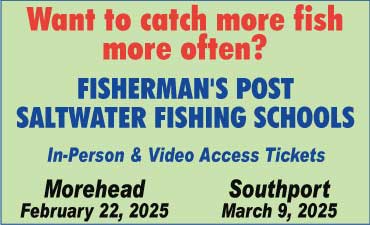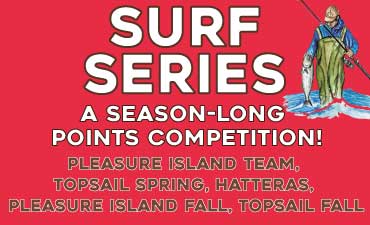Releases June 27, 2013
The U.S. Senate Committee on Energy and Natural Resources unanimously advanced a bill that opens the door to reexamining the onerous beach access closures at Cape Hatteras National Seashore Recreational Area in North Carolina. While the American Sportfishing Association (ASA) recognizes the work and effort that the bill’s sponsors put into this measure and believes that the committee’s action is a step in the right direction; ASA remains concerned that the measure falls short of providing immediate relief to the businesses and individuals negatively impacted by the National Park Service’s access restrictions.
“The recreational fishing-dependent businesses in and around the Cape Hatteras National Seashore Recreational Area should be encouraged by today’s action,” said ASA Vice President Gordon Robertson. “While we would have liked language included in this bill that provides more definitive public access improvements, we do appreciate the hard work by committee staff and the many Senators who helped usher this negotiated bill.”
Roberson also noted, “In particular, we wish to thank Senators Richard Burr (R-N.C.), Kay Hagan (D-N.C.) and Joe Manchin (D-W.Va.), as well as Chairman Ron Wyden (D-Ore.), for working diligently to come to an amenable resolution. We also wish to thank Representative Walter Jones (R-N.C.) for his continued leadership on this issue in the House of Representatives.”
The Cape Hatteras National Seashore Recreational Area is one of the premier surf fishing locations in the United States. Off-road vehicle (ORV) access to the seashore is essential for surf fishing from the beaches, as well as for many other recreational activities.
On December 20, 2010, the National Park Service announced its decision to approve an ORV management plan that closes extensive areas of the seashore to the public and severely limits ORV access, far outweighing what is needed to address resource protection. The final ORV plan, which went into effect on February 15, 2012, has had a devastating impact on the local economy, which is largely dependent upon tourism and recreation.
Earlier this year, the House Natural Resources Committee approved the “Preserving Access to Cape Hatteras National Seashore Recreational Area Act,” introduced by Representative Jones (R-N.C.). That bill, and its companion in the Senate, would revert to an interim management plan that provides greater public access until a new final plan is approved that meets certain access conditions. That bill faced significant opposition in the Senate, but within the last month, the bill’s sponsors and Senate Energy and Natural Resources committee staff worked to produce the substitute bill the committee passed today.
“This substitute bill provides a real opportunity to alter the Hatteras management plan in a way that better accommodates public use and enjoyment of this recreational area,” said Mike Leonard, ASA’s Ocean Resource Policy director. “It’s unfortunate that Congress has had to legislate this issue because the National Park Service did such a poor job of allowing for reasonable and balanced public access in the first place.”
“We urge Congress to move swiftly to pass this bill,” continued Leonard. “The burden will then fall upon the National Park Service to use this second chance wisely and provide a better balance of public access and resource protection at Cape Hatteras. These two concepts are not mutually exclusive.”
Marine Fisheries Commission Chairman Rob Bizzell has cancelled the commission meeting scheduled for Friday, when the board was to consider a petition for rulemaking that effectively would prohibit trawling in North Carolina’s internal coastal waters.
Bizzell has decided, instead, to ask the Finfish, Shellfish/Crustacean, Habitat and Water Quality, and Sea Turtle advisory committees to review and comment on the petition prior to the Marine Fisheries Commission vote.
The schedule of meetings for these advisory committees will be announced in the coming days.
The petition, submitted by Tim Hergenrader, asks the commission to adopt a rule that makes North Carolina’s internal coastal waters permanent secondary nursery areas, unless they are currently designated as primary nursery areas or special secondary nursery areas. A Marine Fisheries Commission rule, already in place, prohibits the use of trawl nets in secondary nursery areas.
Under state law, the commission has 120 days from the date a formal petition for rulemaking is submitted to either grant or deny the petition. If the commission grants the petition, it will begin a rulemaking process which will include fiscal analysis, notice of text in the state register, a public comment period, and at least one public hearing.
The petition for rulemaking can be found on the N.C. Division of Marine Fisheries website at http://portal.ncdenr.org/web/mf/june-2013-mfc-briefing-book.
For more information, contact Nancy Fish, division liaison to the Marine Fisheries Commission, at (252) 808-8021 or Nancy.Fish@ncdenr.gov.
The N.C. Wildlife Resources Commission recently completed construction of a universally accessible fishing pier that runs along the Cape Fear River at Lock and Dam No. 1 in Bladen County.
The wooden pier extends 30 feet out and is 90 feet wide across the T-section. The pier was designed and constructed by staff with the Commission’s Division of Engineering and Lands Management. Unlike many of the piers constructed by the Commission, the pier at Lock and Dam No. 1 is a fixed pier with driven pilings so that it can withstand high-water events typical on the Cape Fear River.
The pier coincides with the construction of a rock arch ramp—or “fish passage way” that is expected to improve passage of anadromous fish such as striped bass, American shad, river herring, and sturgeon, during their spring migrations upriver to reach historical spawning grounds.
“This is a site that we have been interested in for years,” said Tom Rachels, a fisheries biologist with the Commission. “The construction of the rock arch ramp provided a great opportunity to expand our collaboration with the Army Corps of Engineers and build a fishing pier for anglers who do not have a boat.”
While the Commission built the pier, the U.S. Army Corps of Engineers now owns it and will maintain it. Pier construction was funded through the Sport Fish Restoration Program, which utilizes state fishing license money and funds generated from taxes on fishing tackle and other fishing-related expenditures.
Anglers fishing at Lock and Dam No. 1, which is located about 32 miles upriver from Wilmington, can expect to catch a variety of fish that varies depending on the time of year.
“Between the months of March and May, anglers have the opportunity to catch American shad and striped bass, although they cannot keep the striped bass,” Rachels said. “A few resident striped bass are in the river all year long as are largemouth bass, bluegill, striped mullet, and channel, blue, and flathead catfish.”
For more information on fishing in public, inland waters, including an interactive map of more than 500 public fishing access areas throughout the state, visit www.ncwildlife.org/fishing. For a list of all boating access areas open to the public in North Carolina, visit www.ncwildlife.org/boating.
The N.C. Wildlife Resources Commission will have law enforcement officers out in force June 28-30 in support of Operation Dry Water—an annual nationwide campaign to remind boaters that it is unsafe, as well as illegal, to operate a boat while impaired. In North Carolina, penalties include a maximum $1,000 fine and possible jail time.
“Drinking affects the skills necessary to operate a boat, including coordination, reaction time, balance and rational decision-making,” said Maj. Chris Huebner, the state’s boating safety coordinator and a wildlife officer with the Wildlife Commission. “We want everyone to enjoy his or her time on the water and do so safely. Having a designated driver, for boating and the drive home, is always a good idea.”
Operation Dry Water is incorporated into North Carolina’s multi-agency “On the Road, On the Water, Don’t Drink and Drive” campaign, with wildlife officers from the Wildlife Commission on waterways and troopers from the State Highway Patrol on the highways, working for public safety.
Organized by the National Association of State Boating Law Administrators, Operation Dry Water began in 2009 with the purpose of reducing boating fatalities involving alcohol. A 2012 U.S. Coast Guard study found that while alcohol contributed to 8 percent of boating accidents overall, it contributed to 17 percent—nearly a fifth—of all boating fatalities. Operation Dry Water received this year’s Horizon Award from the National Safe Boating Council for the campaign’s dedication to moving recreational boating safety to a new level.
For more information on safe recreational boating or to enroll in a free boating education course by the N.C. Wildlife Resources Commission, go to www.ncwildlife.org or call 919-707-0031.





